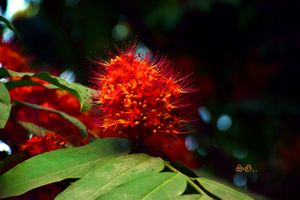Note: This is a project under development. The articles on this wiki are just being initiated and broadly incomplete. You can Help creating new pages.
Saraca asoca - Ashoka, Ashoka tree
Ashoka Tree is one of the most legendary and sacred trees of India and holds an invaluable importance in Hinduism, Buddhism, and Jainism. It is an evergreen tree 15-20 meters high. The leaves are 15cm long and of oblong shape. Ashoka tree produces a huge bunch of sweet smelling flowers all through the year and profuse flowering occurs from February to May. The flowers are polygamous, yellowish orange and scarlet. The plant grows faster in tropical and sub-tropical situation. The bark can be separated from 10 years older trees or more than that. All parts of the tree such as bark, leaves, flowers and seeds are used medicinally. Due to its medicinal value, it is known as a universal plant.
Medicinal use of Ashok plant
The meaning of Ashok in Sanskrit is without grief/ sorrow less. Each part of the tree is of proven medicinal value and cures many disorders; hence it is called Ashoka. The bark is comprised of sodium, silica, magnesium, iron, calcium, aluminum and strontium. Other components include sterol, tannins, catechol and other calcium compounds.
- The barks, seeds and flowers of the tree are helpful in preparing capsules and tonics to solve various gynecological problems of women.
- It also reduces excessive and painful bleeding, leucorrhea and headache for women. Because of chloroform and methanol properties, the bark is used to cure bacterial and fungal infections.
- As the bark contains ketosterol, it treats uterine fibroids and other internal fibroids and is one of the most common household remedies for uterine disorders. Medicine prepared from bark also helps in removing worms and comforts from swelling of the stomach.
- Capsules and ointments prepared from Ashok tree can be used as a natural supplement of great benefit to treat irritations and burning sensation in the skin and complexion.
- Dried flowers are used to cure diabetes. It adds ease for indigestion.
- The extracted juice from the flower is used to cure dysentery.
- Medicine prepared from leaves, flowers and barks are used to cure diarrhea and purification of blood.
- Medicine prepared from the extract of Ashoka can be used for the cure of piles and bleeding caused due to piles.
- Powder from Ashok seed cures kidney stones.
- The ground seed is also used as a memory enhancer.
- The paste of the seed is used for urine retention.
- The ash prepared from Ashok tree cures rheumatoid arthritis and joint pain.
Common name
- English - Ashoka tree
- kannada - ಅಶೋಕ
